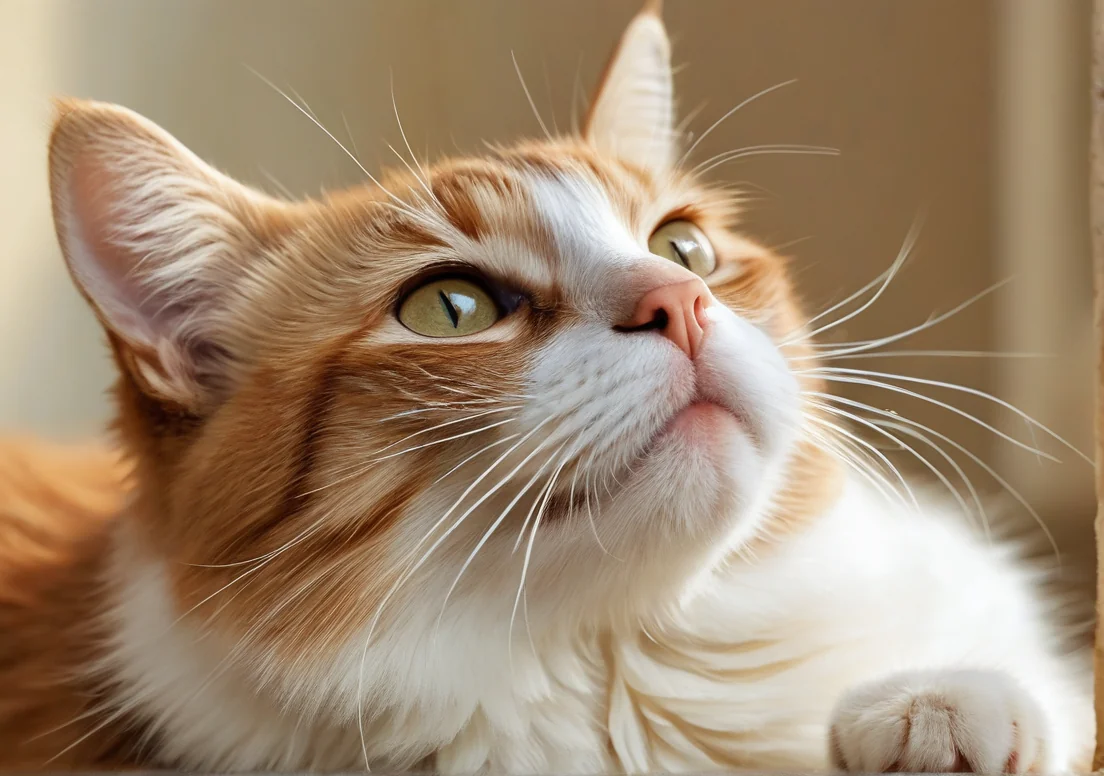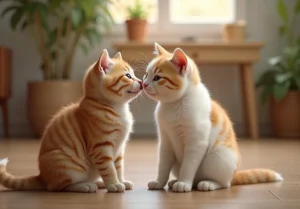Have you ever noticed your cat sniffing every corner of the house? From the laundry basket to your shoes, these curious little hunters seem to have an insatiable need to explore the world through their noses. It’s more than just a quirky behavior; there’s a fascinating science behind it.
Cats sniff everything because their sense of smell is far more advanced than humans. They rely on this powerful sense to gather information about their environment, communicate with other cats, and even detect food. But there are layers to this behavior that go beyond simple curiosity, and you’ll want to discover the intriguing reasons behind it.

What Makes a Cat’s Sense of Smell So Unique
Cats are aromatically adept, boasting a sense of smell that’s approximately 14 times more sensitive than ours. This incredible olfactory prowess stems from their highly specialized nasal anatomy. Their noses contain about 200 million olfactory receptors, compared to a human’s roughly 5 million. This difference significantly amplifies their ability to detect scents and identify various stimuli in their environment.
Understanding a cat’s nose reveals some interesting elements. They possess a unique structure called the Jacobsen’s organ, located on the roof of their mouth. This organ helps them process pheromones and other scents, connecting smell directly to their sensory processing systems. This is why you’ll often see them with their mouths slightly open, as they take in more information to assess their surroundings.
This heightened sensitivity isn’t just for show. Cats rely on their keen sense of smell for survival, whether they’re hunting, navigating, or understanding their territory. It plays a crucial role in their interactions with other animals and even with humans.
How Do Cats Use Their Sense of Smell
Cats are constantly analyzing their environment through scent, which influences their behavior in fascinating ways. Here’s a closer look at how they use their powerful sense of smell:
Communication : Cats communicate with each other and their humans using scent. They have distinct markers on their bodies that release pheromones, allowing them to signal territory or health status to others.
Navigation : Their sense of smell helps them navigate familiar and unfamiliar territories. They can locate food, identify safe spaces, and recognize other cats in the area through scent trails.
Hunting : For an apex predator, such as a cat, scent plays a pivotal role in hunting. They can detect the scent of potential prey from considerable distances, critically enhancing their hunting strategies.
Familiarity and Comfort : Cats often sniff or rub against objects and people to establish familiarity and comfort levels. The scents in their environment can provide reassurance and help them feel secure.
Detection of Illness : Interestingly, cats can also detect health changes in others through smell. Research indicates that they may recognize certain scents associated with health issues, providing insight into the well-being of their companions.
The next time your cat gives that curious sniff to everything in sight, remember: it’s all part of their intricate process of understanding and interacting with the world around them. They’re using their scent-based skills to form connections and make sense of their environment. This instinctive behavior is not just cute; it’s a crucial aspect of their survival toolkit and social structure.
What Information Do Cats Gather When They Sniff
Cats rely heavily on their sense of smell—it’s their primary way of understanding the world around them. While humans have around 5 million scent receptors, cats pack a whopping 50 to 80 million in their noses! This means that when they’re sniffing everything in sight, they’re gathering a treasure trove of information.
When a cat sniffs, they can detect numerous scents that reveal details about their environment, such as:
- Other Animals: A whiff of another creature’s scent can tell them who’s been around, if it’s a friend or foe, and even their reproductive status.
- Food: The aroma of food helps them assess whether something is edible. They’ll sniff to see if it smells fresh and safe.
- Territory: Cats are territorial beings. They can pick up on pheromones left by other cats, signaling if an area has been marked or if it’s safe to explore.
- Human scent: They notice our unique smells, including what we’ve been handling, which influences their behavior toward us.
Interestingly, cats also have a special organ called the Jacobson’s organ located on the roof of their mouths. When they curl their lips back in that strange face, they’re actually enhancing their sniffing game by pulling scents into this organ for further analysis.
Why Do Cats Sniff You?
Cats have a knack for sniffing their humans with genuine curiosity. When your cat gets up close and personal with your scent, they’re not just being nosy. They’re building a bond with you. Cats are social creatures, and sniffing is their way of communicating and understanding their environment, including the people in it.
Here are some reasons why your cat might sniff you:
- Bonding: Cats often want to feel comfortable with their humans. They’ve learned to trust you, and sniffing is a sign of affection.
- Gathering Information: Your scent carries a lot of info—what you’ve eaten, where you’ve been, and even how you’re feeling. They’re keen to know what’s going on in your life.
- Exploring Changes: If you’ve recently changed your perfume, lotion, or laundry detergent, they’ll want to sniff it out. Any new smells can pique their interest and even trigger some investigative behavior.
- Identifying Emotions: Cats can be sensitive to their owners’ emotions. They might sniff you more when you’re stressed or upset, trying to gauge your feelings and respond appropriately.
In short, when your cat sniffs you, it’s not just cute; it’s their way of connecting. Understanding this can deepen your relationship. Plus, if they consistently linger on a particular scent, it might just mean they love that new lotion you’re using!
How Does Smell Affect a Cat’s Behavior?
Cats rely heavily on their sense of smell—far more than humans do. With about 200 million scent receptors, their olfactory prowess allows them to detect pheromones and other chemical signals that provide vital information about their environment. The scents they encounter can trigger different behaviors, from hunting instincts to social interactions.
When a cat sniffs something, it’s like they’re casually reading a newspaper. They pick up traces of other animals, food sources, or even potential threats. A familiar scent can make them feel more secure, while unfamiliar odors might prompt alertness or even anxiety. For example, if they catch a whiff of another cat’s scent, it can lead to increased curiosity or territorial behaviors, such as marking their own scent over it.
Conversely, certain scents—like catnip—can elicit playful and euphoric responses, leading to a burst of energy or playful antics. This olfactory sensitivity is essential not just for survival but also for understanding their world. So, the next time your cat is intensely sniffing around, they’re simply tuning into their environment in a way you might not fully grasp.
Why Are Cats So Nosey?
A cat’s inquisitive nature isn’t just for kicks; it’s tied to their natural instincts. Cats are predators by design, and exploring their territory through sniffing is a part of their hunting strategy. By investigating every nook and cranny, they’re gathering information and securing their domain.
Here are some key reasons why cats have that curious nose:
Territory Exploration: Sniffing allows them to check for any intruders or familiar scents from other animals, keeping their domain safe.
Communication: Cats communicate through scent markings. A quick sniff can help them understand who’s been visiting their turf.
Food Identification: Scents can indicate whether something is safe to eat. This helps them avoid potential dangers.
Mood Assessment: They can sense the emotional state of people or other animals through their unique chemical signatures.
Environmental Awareness: Sniffing helps them gauge changes in their surroundings, keeping them alert to anything unusual.
Cats aren’t just being nosey; they’re actively trying to understand their environment. Next time you see your feline friend investigating a box or a corner, remember, it’s all part of their instinctual charm.
Embrace that curiosity; it’s a vital part of who they are!
Can Cats Smell Emotions?
Cats are surprisingly tuned in to our feelings, and their sense of smell plays a big part in that. They’ve got about 50 to 80 million olfactory receptors in their noses—compare that to our mere 5 million! This gives them an edge in picking up on pheromones and scents that might go unnoticed to us.
When a cat sniffs you closely, they might be trying to gauge your emotional state. It’s believed they can detect subtle changes in our body chemistry related to stress or happiness. For instance, if you’re feeling anxious, your body releases different pheromones, maybe even sweat, and your cat can sense that, reacting accordingly. This instinctive behavior allows them to offer comfort or keep their distance based on how you’re feeling. In a way, your cat’s nose is like an emotional radar, helping them navigate their interactions with you.
Fun Facts About Cats and Smell
Here’s a list of surprising tidbits about how cats interact with the world through their extraordinary sense of smell:
- Pheromones: Cats have glands that release pheromones—scents used for communication. They often rub their face against objects to leave their mark.
- Taste and Smell: Cats have a unique connection between taste and smell. Since they lack taste buds for sweetness, they rely heavily on their sense of smell to find food.
- Scent Memory: Cats have an impressive scent memory, often recognizing familiar scents long after their initial encounter.
- Hunting Tools: Their sense of smell helps them locate prey. A cat can track a scent trail that’s several hours old!
- Hierarchy of Smell: Cats can identify scents in layers. This means they can detect scents like food, danger, and pheromones all at once, allowing them to react appropriately.
Tip: To enrich your cat’s environment, try using different natural scents, like herbs or catnip, to stimulate their senses and keep them engaged.
The Role of Smell in Cat Health
Cats rely heavily on their sense of smell to interact with the world around them. While humans might perceive the world primarily through sight, cats have a vastly superior olfactory system—with around 50 to 80 million olfactory receptors compared to our measly 5 million. This heightened sense allows them to gather vital information about their environment, from identifying food and recognizing familiar scents to detecting potential predators or opportunities to play.
A change in a cat’s sniffing behavior can be a signal of health issues. For instance, if your cat suddenly becomes less interested in sniffing things or exhibits a significantly decreased curiosity, that could indicate underlying problems. Dental issues, respiratory infections, or even conditions like hyperthyroidism might impair their sense of smell, affecting their overall health and enjoyment of life. Always keep an eye on these shifts, as your cat’s nose is often a good indicator of their well-being.
What Happens When Cats Lose Their Sense of Smell?
Impaired smell can change a cat’s behavior in surprising ways. A cat that once enjoyed sniffing everything from the couch to your shoes might start to seem indifferent. This disinterest can lead to lowered appetite, as smell plays a crucial role in a cat’s ability to enjoy food. They might also become withdrawn, as exploration through scent is a big part of their daily activities.
Behaviorally, a cat that struggles to smell may show increased anxiety. They rely on scent to assess their environment, so a loss of this ability can lead to confusion or a feeling of vulnerability. This could manifest in them being more clingy or seeking out familiar smells more often.
Changes in your cat’s sniffing habits should prompt a trip to the vet. It’s essential to rule out any serious health issues. Here are some potential effects to consider:
Loss of interest in food – If their kibble or treats suddenly don’t seem appealing, the cause might be a decreased sense of smell.
Reduced curiosity – A formerly mischievous kitty might turn into a couch potato if they can’t smell anything worth investigating.
Increased aggression or anxiety – If they can’t perceive their surroundings accurately, they might react more defensively.
Heightened reliance on vision and hearing – They may start using sight more but often still feel uneasy with this limited sensory input.
Difficulty recognizing familiar people or pets – They may not react as they once did to friendly faces, which can cause stress for both the cat and its humans.
Being aware of these signs can help you take action early. Regular vet check-ups and monitoring your cat’s behavior can catch potential problems before they escalate. If you’re concerned, don’t hesitate to get a professional’s perspective—it’s always better to be safe than sorry!
Alex, a passionate animal lover, has experience in training and understanding animal behavior. As a proud pet parent to two dogs and three cats, he founded AnimalReport.net to share insights from animal experts and expand his knowledge of the animal kingdom.




